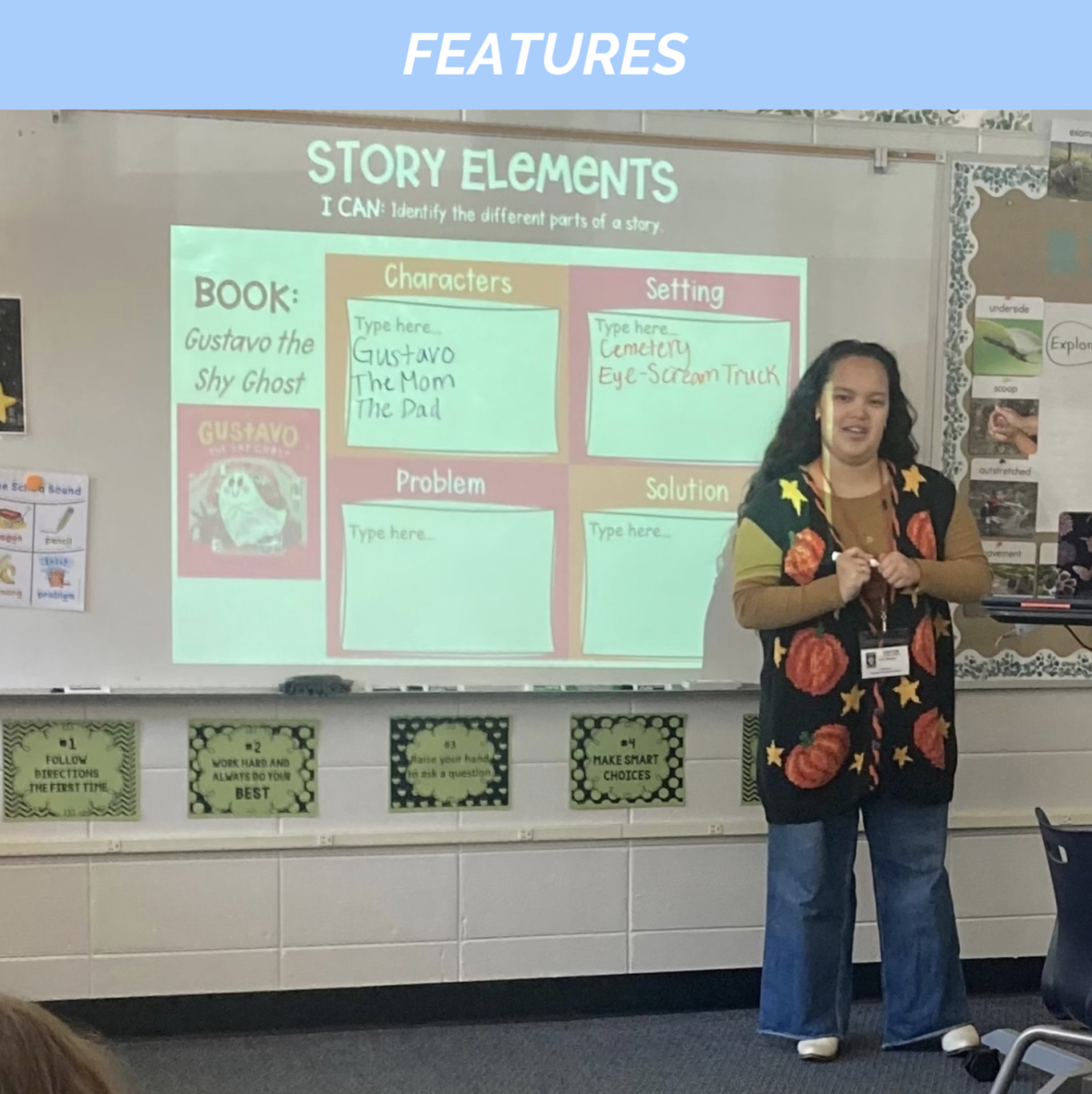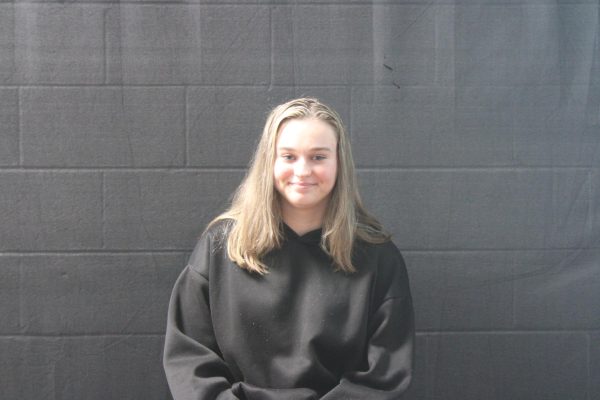Junior Ashley Pappas was six years old when she started noticing intense stomach pains. Thinking she was just making an excuse to get out of school, Ashley’s mom thought nothing of it until Ashley started waking up in the middle of the night crying in pain.
In response, Ashley’s mom took her to the pediatrician, who referred her to a gastroenterologist. After thorough testing, the doctor gave Ashley her first of many diagnoses: Crohn’s, a disease that causes inflammation of the tissues in the digestive tract with no known cause, according to the Mayo Clinic.
Since then, Ashley has been diagnosed with Ehlers-Danlos syndrome (EDS), a connective tissue disorder that causes hypermobile joints, according to the Mayo Clinic. She has also developed Postural Orthostatic Tachycardia Syndrome (POTS), which is a nervous system disorder that is associated with lightheadedness and fainting, according to Johns Hopkins Medicine.
Most recently, Ashley has experienced Autoimmune Progesterone Dermatitis with Anaphylaxis (AIPD), which is a reaction to endogenous progesterone, a steroid hormone that takes place throughout the menstrual cycle, according to the National Institutes of Health.
After her first diagnosis, Ashley was too young to understand what that meant. As she got older and was able to understand more about her illnesses, she started to realize how they affect her.
“Hearing about what everything is and navigating it all [is] probably the scariest part [about being diagnosed],” Ashley said.
Being with her through it all, Ashley’s mother, Amy Pappas, went through several emotions when watching Ashley fight through her conditions.
“With her first diagnosis, it made me sad,” Amy said. “For a while, [I] did believe her that her stomach was hurting, [but] I was like, ‘Oh no, you’re just anxious.’ So it took me a while to take her to the doctor, so I felt guilty, but then I just felt sad because I knew she was just in so much pain, and it’s just heartbreaking when your little child is sick.”
Living anything but a normal teenage experience, Ashley has missed over 157 classes this year due to pain and doctor’s appointments.
Because of Ashley’s health problems, she’s had to drastically change her lifestyle over the last 10 years. The biggest sacrifice she had to make was quitting sports, including one of her passions, competitive dance. Since she was fainting and experiencing severe pain, Ashley had to make the simple yet difficult decision to stop dancing.
“I was a mess,” Ashley said. “That was something that made me lose motivation for anything else, which made everything go downhill … Once the doctor said ‘You can’t dance anymore,’ I also stopped going to school, and I also stopped doing physical therapy. I told my doctors I was not going to come in … I sat in my bed all the time.”
Not only did quitting dance affect her emotional health, but it also took a toll on Ashley’s social health. Most of Ashley’s friends were dancers, so by not being able to go to dance, she was no longer going to the studio as often.
“I never really see [my friends] as much as I used to because most of the time I’d see them would be during dancing,” Ashley said. “As a competitive dancer, you’re at the studio 24/7, [so] that was really hard. I felt really lonely.”
Despite that, Ashley’s friends and family support her through it all. When she can’t go out, her friends sit in bed with her and watch movies. With the support of her family and friends, Ashley slowly got herself out of her slump.
“I started realizing [that] if I don’t do anything, then I’m never going to get better,” Ashley said. “So I started doing a bunch of treatments and therapies [to get better].”
Another area that was impacted due to Ashley’s illness was school. Entering Prospect as a freshman, she dealt with a huge life change while dealing with chronic pain and other symptoms due to her illnesses. This created a massive educational challenge for Ashley.
In order to help her keep up with classes and ultimately succeed, Ashley has a 504 plan, which includes accommodations such as extra time on assignments, extra time on tests, being able to miss more school and not be penalized, an elevator key, a PE waiver, taking breaks when needed and being able to go to the nurse whenever she needs to.
Additionally, Ashley credits a lot to her guided study teacher, Kimberly Murray, who helped Ashley get through the year.
“Murray was a lifesaver [during Ashley’s] freshman year,” Pappas said. “She really helped our family get her through the first year of high school because that was hard.”
In efforts to motivate Ashley to come to school, Murray would let her go to room 142, a special ed classroom, to help out when she was done with her work or to talk when she was having a difficult time at school. On top of that, in her sophomore year, Prospect started to give her credit for service learning where she would assist the special ed kids as a student helper, which will help her reach her future goal of becoming a special education teacher. Ashley recalls one time, when Murray and her were in the classroom, when Murray’s URise science class came in to drop off their belongings .
“She knew everybody …” Murray said. “She lit up [the room] and chatted with them.”
Over time, Murray has seen Ashley overcome several challenges and has witnessed large amounts of growth from her as a student. Both physically and mentally, Ashley impresses Murray.
“[Ashley has] become a mature communicator, and she doesn’t wait to be told what needs to get made up and what needs to happen; she has control of that,” Murray said.
Furthermore, Murray has noticed that Ashley is determined to succeed, especially when it comes to her work ethic.
“She was definitely a hard worker,” Murray said. “She definitely does a good job taking initiative; back then, she was a little more timid, and now I see her as a little more engaged and involved and connected.” Ashley continues to move forward with a positive attitude despite all the challenges she has faced in the past few years.
“She has very strong resilience, and she’s not letting chronic illness get in her way as much as possible,” Murray said. “I think that’s admirable, and I think that’s something we all could learn from.”
Considering the illnesses, Amy wants to help her daughter live her best life and manage every step of the process.
“I just try to be strong for her, and I try to still make her have as much fun as I can,” Amy said.
With the support of her mom, Ashley has managed to stay her fun and loving self, explained Amy.
“Ashley is amazing,” Amy said. ”She is the strongest person I know. She’s hilarious. She’s loving [and]she’s sweet. She has her moments where she gets down, but she picks herself right back up. It’s amazing to watch … I’m just very proud of her.” According to Amy, the best way to support someone with chronic illness is to just be there for them and ask them what they need.
While her friends have been supportive of Ashley, Prospect has been a huge help to the Pappas Family as well.
“Prospect’s been amazing this year …” Amy said. “She missed the most school and they have [been] … helping her so much and … so understanding, and they have been so good. We have been so fortunate [because] normally she probably wouldn’t graduate on time, but they’re making it happen.”
With most of Ashley’s illness being autoimmune, there is no cure. However, with proper medication and treatment her conditions can get better. With her most recent diagnosis being so rare, the doctors don’t know much about it, but they hope the treatment will work, so Ashley can one day live a normal life and live pain-free.
When dealing with her conditions, Ashley always tries to remind herself of other perspectives, especially when she feels down.
“A lot of times when I’m feeling super depressed about my illnesses it’s usually because … a lot of my illnesses are super rare …” Ashley said. “I feel pretty alone, so I try to tell myself other people are going through things that I don’t know about … and everyone’s fighting their own battles and it’s going to get at least a little bit better.”













